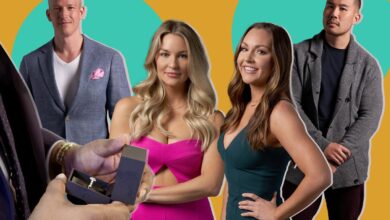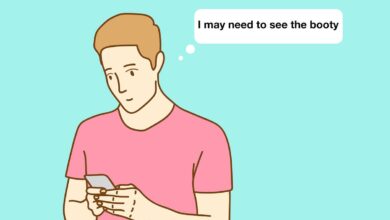The new dating rulebook: How women are embracing post-pandemic love

It’s fair to say that Covid and dating don’t exactly mix. From social dustancing to sex actually being illegal (remember that?), it’s been a historically challenging couple of years for those looking for love. Yet, as we emerge from what is hopefully the worst of the pandemic, many women are using it as a chance to reconsider how they want to navigate the dating landscape.
The pandemic has meant that dating apps weren’t only the most popular way to meet people, but they were the only way. Unsurprisingly this tunnel-vision approach has led to dating app burnout. By the end of 2021, research from dating app Badoo found that 78 per cent of daters felt “stressed” and “let down” by consistently going on incompatible dates.
For Emma Carney, a 35-year-old from London, the pandemic emphasised just “how bad” women have it when it comes to dating. “To be honest, I think it’s hard to shine through a dating app,” Carney tells The Independent. “The focus is on looks; some of us aren’t photogenic and people can be cruel.”
Carney explains that along with dick pics, men have tried to “neg” her, a way of backhand complimenting someone into believing they are not good enough. “I have also met some lovely men on the apps,” she adds, “but there just wasn’t the right vibe. I guess that’s the issue many people have with dating apps. You get really excited about texting, then you meet and it’s just not there. It can be so disheartening.”
After setting up her own digital agency and moving to a new London flat, Carney’s life has become busier and exciting in other ways, and actively dating has lost any appeal — it’s simply “too much effort”. “Why date when you can have fun with your friends or travel?” she says. “Why worry about mixed messages when you can just go have fun and enjoy life again elsewhere?”
The pitfalls of dating apps are all too familiar for the anonymous sex, dating and relationship educator who goes by the name La, La, La, Let Me Explain. La is the author of the new book Block, Delete, Move On and says she is “inundated” with messages from women trying to navigate the modern dating scene.
“It can be very easy to minimise, dismiss, or even not notice some of the very misogynistic aspects of dating culture,” La says. “For example, being asked for nudes and being belittled or mocked for being a prude if you don’t send them. Many women feel that ‘this is just what men do’ rather than framing it as inappropriate and rooted in misogyny and sexual objectification.”
La adds that it “is possible” to engage with dating apps in a healthy way if you are aware of the “red flags and you feel empowered to block, delete and move on when you spot them”.
Dating coach and matchmaker Laura Buckley has also witnessed a growing disillusionment with dating apps. “Having been unable to meet people organically for so long, I’ve seen a real shift in women being more focused on their strategy for dating,” she says.
For Minreet Kaur, 41, from Hillingdon, prioritising meeting people in real life is her new focus, after encountering several “sleazy guys” online. “I find it so off-putting and uncomfortable, some of the things men say. I’ve had a lot of bad experiences, and it’s just scarred me for life,” she says. Instead, Kaur has signed up to a weekly Parkrun, and intends to visit a different location every Saturday. Then there’s ramblers’ walks, holidays, cookery and pottery classes, theatre volunteering, wine, book, golf or tennis clubs — in fact, anything goes…so long as it’s not on an app.
And she’s not the only one; single mum Emma Morgan from Birmingham is “more open than ever” to the possibility of meeting someone in person. She found herself in a “toxic and manipulative” romantic dynamic via a dating app during the first lockdown, which she credits to “not being able to meet in person for such an extended period of time”, and has found it difficult to rebuild her trust with men online ever since.
The resurgence of in-person dating is further proof that dating app culture is no longer hitting the sweet spot. In Liverpool, 30-year-old Jess Evans has recently launched her new business, Bored of Dating Apps which organises regular single’s events and nights out. Informed by her own experiences, Evans believes dating apps have “hit their sell-by-date”and “kissed the life out of romance”. She wants to make the whole experience more “organic, fun and unashamedly bold again”.
“It’s not speed dating, it’s not contrived, it’s great nights out with live music and drinks, where everyone just so happens to be single at the bar,” she says. Other activities are inspired by the cult 90s TV shows, Blind Date and Streetwise, where compatible singles will be paired together and sent on a blind date, after submitting information such as what their biggest turn offs are, and how they like to spend a Sunday.
Evans adds: “It’s not fun to turn up to a date after weeks of chatting, only to find you don’t even fancy the person! It’s soul-zapping, and there’s no accounting for chemistry. With the offline dating movement coming back into our lives in a big way, it almost feels like we’re all taking a sigh of relief. I believe we’re only seeing the tip of the iceberg. It’s a new chapter of modern dating, and it really is a return to more of a simple, stripped back and unpretentious time. People are hungry for it.”
Old habits still die hard. The very nature of dating, romance and love is that it is a bespoke experience. Despite their difficulties, dating apps are still a tool which offer the potential of meeting someone special, and for those still choosing to surrender to the algorithms, the landscape has also shifted.
One-nights stands as a default dating ‘strategy’ are ultimately not satisfying
The past two years have seen the introduction of video dating, which can be a time-efficient way to screen potential matches from the safety of your home. According to Hinge, two-thirds of users see their first video chat as a way to get to know someone, rather than their first date.
The new dating app Sauce aims to make “dating less dry” with profiles made up of videos, so you can sense someone’s energy before meeting them. It ambitiously claims that 95 per cent of first dates lead to second ones. Similarly, another new contender, Snack, is exclusively for those aged 18 to 35 years old and also centres on users engaging with each other’s video content, in a kind of TikTok flirt-off. Snack also includes an anti-ghosting feature, which works by “deprioritising” profiles belonging to users with a poor track record. According to La, ghosting is one of the most frequent complaints she receives, with “being ghosted after sex…a common theme in my DMs”, so it’s encouraging that Snack is attempting to take accountability for such a dispiriting phenomenon.
Yet when So Synced, a dating app that matches compatible personality types, conducted a survey of 1,000 users in order to better understand how the pandemic has impacted the way people date, 78 per cent said deeper connections were now more important to them. According to Hinge, 75 per cent of users are looking for a relationship right now, and 46 per cent of users want to find more creative ways to go on dates. And one-third say the biggest silver lining to dating during the pandemic has been that they know more about themselves and what they want in a partner.
“People are ready to find someone and are not willing to waste their time with someone who isn’t looking for the same thing,” Hinge’s Director of Relationship Science, Logan Ury, says.
Many people have felt dating app burnout during the pandemic
Video chatting to a dating app match has become more popular during the pandemic





